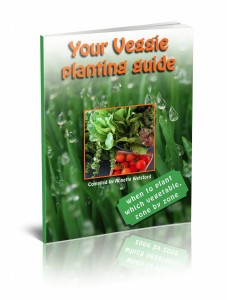Companion Planting for Vegetable Gardeners
Are You Sick of Nasty Pests Decimating Your Veggie Garden?
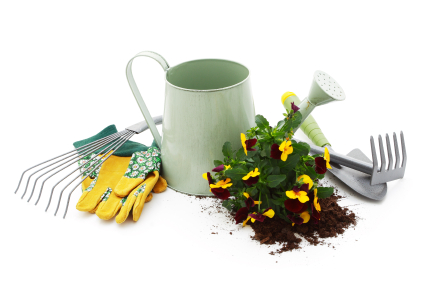
Has This Happened To You?
You’ve worked very hard, preparing the soil months in advance so you can nurture your seedlings in a beautiful loamy, moist mix, absolutely brimming with nutrients…
You’ve hand raised your seedlings, lovingly from seed, or purchased nice sturdy ones from your local garden centre and gently planted them in rows into their lush new home.
You spend hours mulching, watering, feeding, staking and caring for them with all the love you can muster.
And then…..
… When you go out there to pick a beautiful tasty bunch of tomatoes for your lunch, you notice they’ve got holes in them! Something has beaten you to them
Or
… Your crisp perfect lettuce leaves are full of holes – they’ve been enjoyed by the thriving snail population
|
|
| Snails can quickly chomp through your precious veggies |
Or
… You discover your corn is not doing so well – it’s well, just not that healthy looking.
What Has Happened To Your Beautiful Veggie Garden?
All your hard work has been in vain!
You can’t pick these mangled veggies and serve them up to your family!
You’ve not only wasted your efforts, but also the money you’ve shelled out for seeds, seedlings, fertiliser, soil conditioner, stakes, etc.
You feel frustrated….. even angry!
So What Are Your Options?
OPTION 1. Spray them with expensive pest control chemicals which will kill the varmints that have decimated your crops. Yep, this will work, BUT, the chemicals will be poisoning you and your family too. Plus chemicals leave poisonous traces in your soil, drift with the wind and can potentially leach into your waterways and affect your neighbours, pets, fish and wildlife.
OPTION 2. Give up and buy your veggies at the local shop. Sure, this is the easy way, but not very satisfying nor the best answer either. Most shops sell hybrid varieties which are bred for long shelf life at the expense of flavour, texture and taste, and who know what chemicals they’ve been sprayed with.
OPTION 3. Use safe home made pest remedies in conjunction with the age old practice of companion planting to restore your garden’s health and the balance of nature.
What is Companion Planting?
Well, it’s absolutely fascinating. You see… some plants love each other, and others can’t stand each other. A bit like humans!
Join us on our fascinating journey of discovery into the secret social lives of your vegetable garden.
You’ll be amazed at what’s going on in your garden!
By paying attention to the plants that do well together, as well as those that don’t like one another, you will find that you are able to grow a much wider variety of plants in your veggie patch.
You will also find that it is a lot easier to control pests and reduce the incidence of disease destroying your beautiful plants.
Discover the Secret Socialising Behaviour of Plants
Here’s just some of the fascinating socializing “behaviours“ or activities that your plants get up to. You can put these into place in your garden straight away….
- Trap Cropping: How to use specific plants to attract pests away from your crop
- Nitrogen Fixing: How to plant special cover crops which put nitrogen into the soil rather than take it out.
- Biochemical Pest Suppression: Discover which flowering plant oozes a chemical into the soil to repel nasty pests that attack the roots of your tomatoes, sugar beets and soy beans.
- Insectary: How to create habitats or environments to attract beneficial predatory insects that eat the nasty pests which devour your precious garden plants.
- Nurse Cropping: Discover which tall plants with thick foliage protect more vulnerable species by shading them or shielding them from the wind.
Find Out Which Plants Love Each Other
Successful companion planting relies on good relationships, often between pairs. Usually one plant has the ability to do one thing, while the other offers something else.
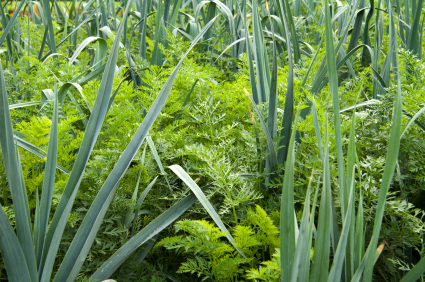 |
| Leeks and carrots protect each other from specific insect pests |
But sometimes it seems that certain plants simply do well together – like cheerful children who have special playmates. For example, parsley and asparagus generally both thrive when planted together.
Most vegetables have a handful of favourites they love to be near. For example carrots love basil, lettuce, onions, peas, rosemary, sage and tomatoes.
But did you know that cauliflower only has one favourite? And the same with broad beans. They’re pretty fussy too!
Other plants that are generally said to improve the quality of crops in the vegetable garden include elderberry trees (which are really large shrubs), buddleia, privet, golden rod, mustard and wild rose.
What About Plants That Hate Each Other?
Plant the wrong things next to each other and you’ll have all sorts of problems!
….. For example, forget about tomatoes and corn together. They just don’t get on.
And there’s one veggie plant you should never grow near any other veggie plant, and a tree which will poison anything you plant near it.
 |
| When bush beans are planted with potatoes, they will protect them from the Colorado potato beetle, one of the most destructive bugs that attack potatoes. This is a mutually beneficial relationship, as the potato in turn protects the beans from the Mexican bean beetle. |
Discover All the Different Ways You Can Control Pests Naturally
It is in the realm of pest control that many companion plants excel. Some attract insects that would otherwise attack other plants,and some are attracted to trees and bushes that in turn attract birds that catch flying insects.
Sometimes two different plants are able to repel different unwanted insects from each other – so they work in harmony together. See the example at left about how bush beans and potatoes work together.
There are also many natural pesticides that you can make at home.
These range from soapy mixtures to wonderful brews that are made by boiling a range of very specific plants together. They are easy to make at home – in fact you’ll probably find you already have most of the ingredients in your cupboard!
You can also buy natural products that will kill pests that attack your veggies, which is what commercial organic farmers do.
How to Get All the Answers Now
Now it’s easy to get all the answers to companion planting and pest control.
Keen gardener Annette Welsford has done all the hard work for you in her book Companion Planting for Veggies. (Annette’s other high quality gardening books are best sellers in 85 countries. Read all about them here)
This wonderful ebook contains everything you’ll ever need to know to integrate companion planting in your veggie garden.
Take a tour of the contents….
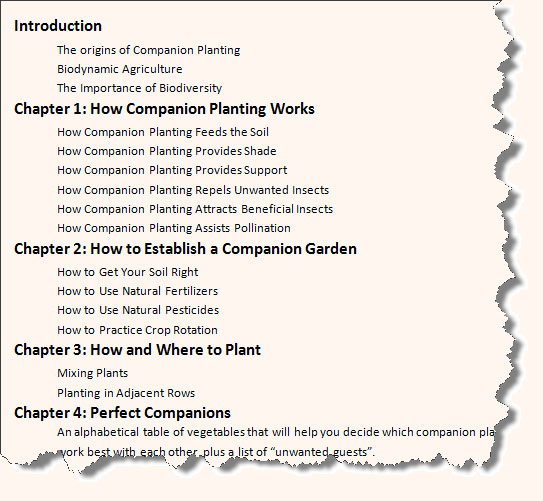
Get Companion Planting for Veggies Now
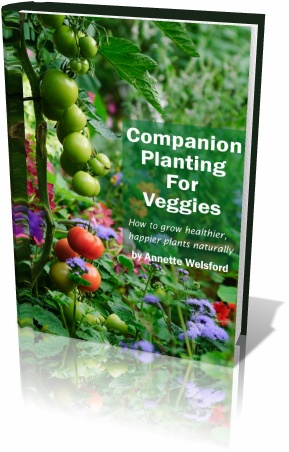 |
A fantastic resource to help you create a garden where your plants grow happily with each other, working in harmony to support each other and keep away harmful pests.This comprehensive beautifully illustrate guide, valued at $16.95 is available now for instant download to your computer.
By identifying useful plants that play an active role in improving soil and pest control, you can ensure that you always have a ready supply of companion plants to help you get the most out of your gardening. |
|
Bonus 1: How to Control Pests Using Natural Remedies A really valuable resource you’ll refer to over and over again. It’s jam packed with loads of useful advice, recipes and remedies for controlling pests naturally. 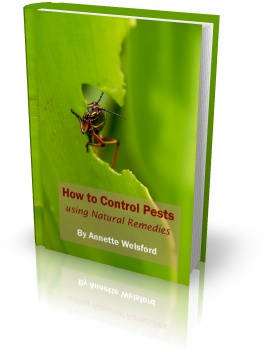 You’ll discover:
|
|
Bonus 2: Your Veggie Planting Guide – Zone by Zone This wonderful guide helps you to identify your local climate zone, and provides detailed advice of when to plant every vegetable in your local zone. We’ve provided an overview of the climate classification system and zone and temperature range maps for Australia, New Zealand, Europe, United Kingdom, North America and South Africa. Simply turn to your zone and peruse our detailed tables to discover exactly when you should plant your favourite vegetables. |
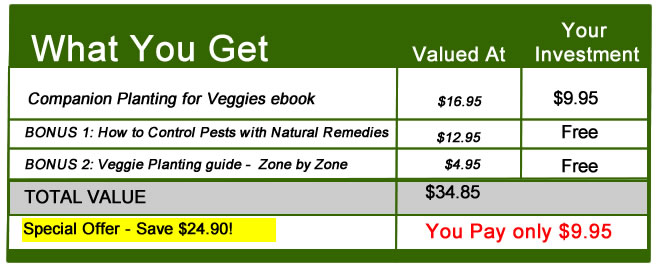
Don’t let any more pests decimate your precious garden
Get your garden working in harmony now. You’ll be delighted with the results!

Best wishes for a happy and harmonious veggie patch at your place!

Annette Welsford
Author and publisher
PS: If you’re fed up with not having control over what happens in your veggie garden, download Companion Planting for Veggies and How to Control Pests using Natural Remedies and take action now.



